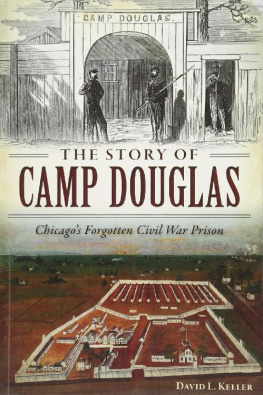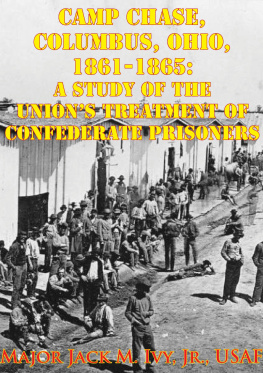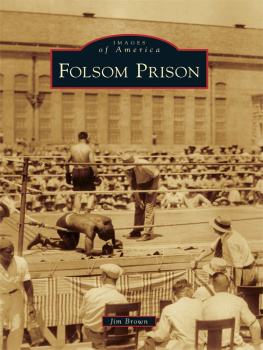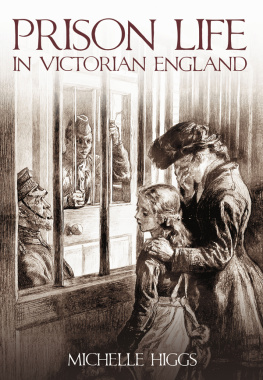
Johnsons Island
CIVIL WAR IN THE NORTH
Broken Glass: Caleb Cushing and the Shattering of the Union John M. Belohlavek
Banners South: A Northern Community at War Edmund J. Raus
Circumstances are destiny: An Antebellum Womans Struggle to Define Sphere Tina Stewart Brakebill
More Than a Contest between Armies: Essays on the Civil War Edited by James Marten and A. Kristen Foster
August Willichs Gallant Dutchmen: Civil War Letters from the 32nd Indiana Infantry Translated and Edited by Joseph R. Reinhart
Meades Army: The Private Notebooks of Lt. Col. Theodore Lyman Edited by David W. Lowe
Dispatches from Bermuda: The Civil War Letters of Charles Maxwell Allen, U.S. Consul at Bermuda, 18611888 Edited by Glen N. Wiche
The Antebellum Crisis and Americas First Bohemians Mark A. Lause
Orlando M. Poe: Civil War General and Great Lakes Engineer Paul Taylor
Northerners at War: Reflections on the Civil War Home Front J. Matthew Gallman
A German Hurrah! Civil War Letters of Friedrich Bertsch and Wilhelm Stngel, 9th Ohio Infantry Translated and Edited by Joseph R. Reinhart
They Have Left Us Here to Die: The Civil War Prison Diary of Sgt. Lyle G. Adair, 111th U.S. Colored Infantry Edited by Glenn Robins
The Story of a Thousand: A History of the 105th Ohio Volunteer Infantry Albion W. Tourge, Edited by Peter C. Luebke
The Election of 1860 Reconsidered Edited by James A. Fuller
A Punishment on the Nation: An Iowa Soldier Endures the Civil War Edited by Brian Craig Miller
Yankee Dutchmen under Fire: Civil War Letters from the 82nd Illinois Infantry Translated and Edited by Joseph R. Reinhart
The Printers Kiss: The Life and Letters of a Civil War Newspaperman and His Family Edited by Patricia A. Donohoe
Conspicuous Gallantry: The Civil War and Reconstruction Letters of James W. King, 11th Micigan Volunteer Infantry Edited by Eric R. Faust
Johnsons Island: A Prison for Confederate Officers Roger Pickenpaugh
Johnsons
Island
A Prison for Confederate Officers
Roger Pickenpaugh
The Kent State University Press Kent, Ohio
2016 by The Kent State University Press, Kent, Ohio 44242
All rights reserved
Library of Congress Catalog Card Number 2015036106
ISBN 978-1-60635-284-7
Manufactured in the United States of America
Quotations from the J. L. Stockdale Diary, from the Confederate Prisoners of War Collection in the Alabama Department of Archives and History, appear courtesy of the Alabama Department of Archives and History. Quotations from the Papers of Thomas Gibbes Morgan Sr. and Thomas Gibbes Morgan Jr. appear courtesy of the David M. Rubenstein Rare Book & Manuscript Library, Duke University. Quotations from the John Harvey Reece Civil War Diary, 18641865 (part of the John H. Reece Civil War Papers, AC 19900011M) appear courtesy of the Georgia Archives. Quotations from the Robert Bingham Papers, Joseph Mason Kern Papers, Luther Rice Mills Reminiscences, and Virgil S. Murphey Diary appear courtesy of the Southern Historical Collection, Wilson Library, The University of North Carolina at Chapel Hill.
Library of Congress Cataloging-in-Publication Data
Pickenpaugh, Roger, author.
Johnsons Island : a prison for Confederate officers / Roger Pickenpaugh.
pages cm. (Civil War in the North)
Includes bibliographical references and index.
ISBN 978-1-60635-284-7 (pbk. : alk. paper)
1. Johnson Island Prison. 2. United StatesHistoryCivil War, 18611865Prisoners and prisons. 3. OhioHistoryCivil War, 18611865Prisoners and prisons. 4. Prisoners of warOhioJohnson IslandHistory19th century. I. Title.
E616.J7P53 2016
973.771dc23
2015036106
20 19 18 17 16 5 4 3 2 1
To
ANYA and MIKE
with wishes for happiness
Contents
As with so many other books, the greatest debt incurred in writing this one is to my wife, Marion. As in the past, she assisted in the research process, helped compile the index, and listened patiently to my ideas and complaints.
My mother, Fern Pickenpaugh, was again an eager proofreader.
Family in northern Virginia made research trips to the National Archives and the Library of Congress much easier and much more fun. Thanks to stepdaughters Anya Crum and Jocelyn Brooks, Anyas boyfriend, Mike Huie, and Jocelyns husband, Patrick, as well as grandchildren Parker and Harrison Brooks.
Locally, members of the Noble County (Ohio) Authors Guild, including Wes Bishop, Tammy Kirchner, Jim Leeper, Mary Lou Podlasiak, Gary Williams, and Ken Williams, provided both assistance and sympathetic ears. Jim also spent hours guiding me through those aspects that required computer skills.
Archivists at the institutions listed in the bibliography were universally professional and personable. So was the staff of the Sandusky Public Library, where I secured photos. I remain indebted to the staff of the Muskigum University Library in New Concord, Ohio. They handled a large number of interlibrary loan requests, saving travel time and expense. Thank you, Zelda Patterson, Nicole Robinson, Jamie Berilla, and Elaine Funk.
This is my first adventure with the Kent State University Press. I hope it will not be the last. They have been courteous, professional, and understanding of inane questions and my near total lack of computer skills.
Montgomery Meigs was a realist. He had to be. As quartermaster general of the Union Army, he was also a man charged with tremendous responsibilities. A career officer, fifth in the 1836 graduating class at West Point, Meigs had gone on to a solid career as an engineer in the peacetime army of the 1840s and 1850s. His crowning achievementin a near-literal sensewas the dome of the United States Capitol, which was nearly completed when the guns aimed at Fort Sumter fired on April 12, 1861, plunging the nation into civil war. The following month Meigs was promoted to brigadier general and named to the post that he would hold during the four years of the war. His daunting task was to keep the Union armies supplied and on the move. In doing so, Meigs would eventually oversee spending in excess of $1.5 billion.
Unlike many of his civilian superiors, General Meigs realized that the war was likely to be long and difficult, and he urged officials to plan accordingly. On July 12, writing to Secretary of War Simon Cameron, he addressed an issue that other officials had overlooked. As in the conflict now commenced it is to be expected that the United States will have to take care of large numbers of prisoners of war, Meigs wrote, I respectfully call your attention to the propriety of making some arrangements in time. The quartermaster general called for the appointment of a commissary general of prisoners. This official would be charged with the care of prisoners now in our hands and preparations for those likely to fall into our possession. Meigs also urged that a site be selected for a depot and














